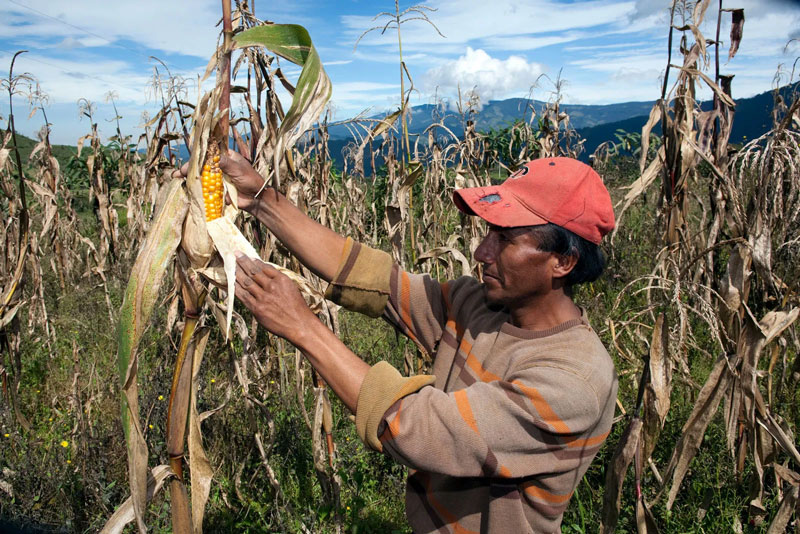Ecuador is facing a food crisis due to a severe corn shortage, driven by drought, poor agricultural practices, and economic factors.
Ecuador is grappling with a growing food crisis that threatens to disrupt the nation’s supply of eggs and other vital food products. The heart of the problem lies in a severe shortage of corn, a key ingredient in animal feed. This shortage has caused alarm across multiple sectors, from egg producers to poultry and pork farmers.
This shortage stems from a catastrophic drought, described by officials as the worst in over six decades. It is further compounded by agricultural mismanagement and a host of environmental and economic factors. As a result, Ecuador is now on the brink of a major food crisis, with soaring prices and the specter of food shortages looming large.
Impact on Egg Producers and Rising Costs
The Union of Egg Producers (Uniproh) has sounded the alarm, issuing a desperate plea to President Daniel Noboa’s administration to intervene before it’s too late. Corn is essential for feeding the country’s laying hens, and the dramatic reduction in local production has put the entire egg industry at risk.
Uniproh points to climate change, which has contributed to this year’s unprecedented drought. Poor agricultural practices, such as using seeds unsuitable for Ecuador’s climate and converting cornfields into cocoa plantations, have also played a part. These factors have created a perfect storm, crippling the corn supply and driving up costs.
The price of corn has skyrocketed in recent months, rising from the government-set price of $16.50 per quintal to as much as $22 on the open market. Egg producers warn that without immediate relief, the cost of eggs will rise sharply, pushing basic foodstuffs beyond the reach of many Ecuadorians.
Broader Implications for Ecuador’s Food Supply
The interconnectedness of the food chain means that the poultry, pork, and aquaculture industries, all dependent on corn-based feed, are also in peril. As the corn shortage worsens, these sectors are seeing similar disruptions, threatening the availability of a wide range of protein sources in the country.
The Association of Balanced Food Producers (Aprobal) has raised concerns, warning that the shortage of corn is already forcing some companies to scale back or even halt production. Normally, Ecuador produces between 1.3 and 1.4 million tons of corn annually, but this year’s best projections indicate a harvest of just 1 million tons—a shortfall of 23% to 29%.
Economic and Agricultural Challenges
The reasons for this decline range from fears of El Niño, which have deterred farmers from planting to a lack of financial resources for small farmers already deeply indebted. The drought, driven by La Niña, has also severely impacted key agricultural regions like Los Ríos, further exacerbating the crisis.
Aprobal estimates that the 300,000-ton reduction in corn production translates into 600,000 fewer tons of animal feed, which will result in about 240,000 fewer tons of chicken or pork for Ecuadorian consumers. This could lead to a substantial drop in affordable protein sources, further driving up food prices.
Calls for Government Action
Both Uniproh and Aprobal are urging the government to act swiftly. Their primary demand is for the immediate authorization of corn imports to stabilize the market.
Without these imports, the short-term consequences could be devastating, with food prices surging and availability plummeting, leaving many Ecuadorians struggling to afford basic necessities.
Government officials, including Minister of Agriculture Danilo Palacios, have acknowledged the severity of the situation. Palacios has confirmed that the government is exploring corn imports to address the shortfall. However, he emphasized that long-term solutions will also be necessary, including better planning, climate adaptation, and more resilient agricultural practices.
Long-Term Solutions Needed
In the long run, Ecuador must strengthen its agricultural sector against future shocks. The current crisis highlights the country’s vulnerability to climate change and the need for more robust, adaptive agricultural policies. Investing in new technologies, more resilient crops, and better water management systems will be essential to securing Ecuador’s food production against future challenges.



Eggs are essential for humans, but other animal products are not. Corn is not used in ideal animal feeds. Proper production techniques and proper food for hens could fix the egg situation.
“food crisis due to a severe corn shortage, driven by drought, poor agricultural practices, and economic factors.” Certainly, drought is a factor, but I bet poor ag practices driven by bad economic policies are vastly larger factors.